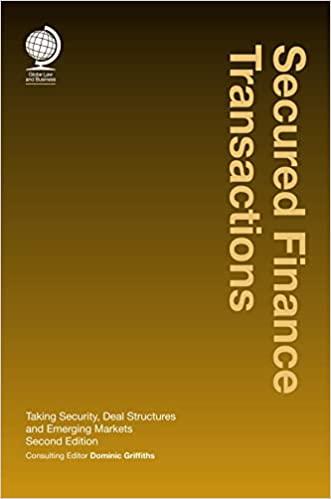Question
2. For this and the next question. The City of Knights issued $10,000,000 of 9% coupon, 20-year, semiannual payment, tax-exempt municipal bonds. The bonds were
2. For this and the next question. The City of Knights issued $10,000,000 of 9% coupon, 20-year, semiannual payment, tax-exempt municipal bonds. The bonds were issued 5 years ago. The bonds can be called now if the city chooses to do so. The call premium is 4% of the face value. New 15-year, 5%, semiannual payment bonds can be sold at par, but flotation costs on this issue would be 2% of the amount of bonds sold. Note that the combined costs associated with calling the existing bonds and paying for the flotation cost of the new issue represent the total initial outlay for the refinancing. The initial cost is $600,000. CALCULATE THE TOTAL SEMI-ANNUAL SAVINGS ASSOCIATED WITH REFINANCING
120,000
30,000
none of the above
3. What is the net present value of the refunding? Note that cities pay no income taxes. Hence, taxes are not relevant in this analysis.
$453,443
$499,921
$240,000
$551,163
none of the above
4. For this and the next 2 question. New York Waste (NYW) is considering refunding a $50,000,000, annual payment, 14.5% coupon, 30-year bond issue that was issued 5 years ago. It has been amortizing $3 million of flotation costs on these bonds over their 30-year life. The company could sell a new issue of 25-year bonds at an annual interest rate of 11.67% in today's market. A call premium of 14% would be required to retire the old bonds, and flotation costs on the new issue would be $3 million. The company's marginal tax rate is 40%. The new bonds would be issued when the old bonds are called. The initial cost of the refunding is $6,200,000?
Calculate the after-tax annual INTEREST SAVINGS if the refunding takes place.
$664,050
$768,000
$849,000
$930,369
none of the above
5. What is the NPV if the bods are refunded today?
$1,746,987
$1,838,933
$1,935,719
$3,785,322
6. A callable bond with an original maturity of 20 years now has 15 years to mature. The bond was originally issued at par with a coupon rate of 12% and semiannual interest payments. The bond can be called 7 years from now at a 20 percent call premium. Calculate this bonds yield-to-call and yield-to-maturity if the current price is $860.
YTC = 14.29%; YTM = 17,09%
YTC = 17.09%; YTM = 14.29%
None of the above
7. Which of the following statements is most correct?
Junk bonds typically carry a lower yield to maturity than investment grade bonds
A debenture is a secured bond which is backed by some or all of the firms fixed assets
All else equal, subordinated bonds typically carry lower yields than mortgage bonds
None of the above statements is correct
8. Assume you wish to purchase a bond with a 30-year maturity, a coupon rate of 10 percent, a face value of $1,000, and semiannual interest payments. If you require 9% yield to maturity, what is the present value of the bond?
$905.35
$1,102.74
$1,103.19
$1,149.63
9. A bond has a coupon rate of 8%, a maturity of 10 years, a face value of $1,000, and makes semiannual payments. If the price is $9.34.96, what is the annual nominal yield to maturity on the bond?
8.39%
9.64%
4.41%
none of the above
Step by Step Solution
There are 3 Steps involved in it
Step: 1

Get Instant Access to Expert-Tailored Solutions
See step-by-step solutions with expert insights and AI powered tools for academic success
Step: 2

Step: 3

Ace Your Homework with AI
Get the answers you need in no time with our AI-driven, step-by-step assistance
Get Started


